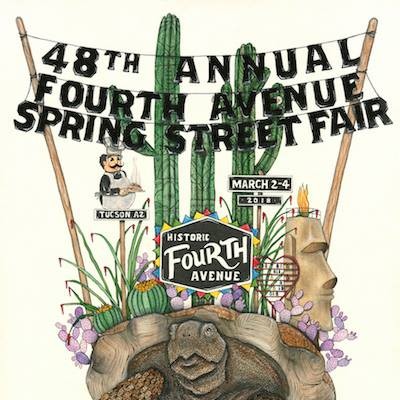The University of Arizona had a bountiful crop of sopranos--and mezzos, for that matter--in late 1990, so the UA Opera Theatre mounted Giacomo Puccini's one-act work Suor Angelica, about a nun with a past. Another wave of golden-throated girls came through the school four years ago, so the UA put on Francis Poulenc's Dialogues of the Carmelites, concerning a doomed convent during the French Revolution. (Arizona Opera will produce this work next season.)
Four years later, women are again dominating the UA's vocal program. "Actually, we always have an abundance of females," notes Opera Theatre director Charles Roe. So, considering the shortage of good convent operas--Prokofiev's Betrothal in a Monastery, for instance, really has nothing to do with nuns or monks--it's back to Puccini for this weekend's UA Opera Theatre presentations.
As they did 11 years ago, Sister Angelica and her fellow singing nuns share the bill with the broadly comic title character of Puccini's Gianni Schicchi. Each opera lasts less than an hour, and they form two-thirds of a 1918 triptych that begins with a grisly little melodrama called Il Tabarro. As before, Roe has elected not to cram Tabarro into the evening, too, although he did consider mounting it separately a couple of years ago.
"Il Tabarro needs an awfully strong baritone--and an excellent tenor and soprano, too," Roe said late last week, saving his voice as much as possible for his own impressive baritone solos in Carmina Burana with the Tucson Symphony. "We were all ready to do Tabarro with the right cast, but the tenor left school, and that killed our chance."
Roe offers no apology for doing only two out of Puccini's three one-acts.
"These two add up to a good length for an audience; people don't have a chance to get restless, and the two operas are so different that nobody should get bored, anyway," Roe said. "These are ideal shows for a college production. They're both so well written, and Schicchi especially is a great ensemble show. It gives everybody a chance to develop a character and work together in an ensemble."
Gianni Schicchi was inspired by a half-dozen lines in, of all things, Dante's Inferno. That mention itself was derived from an actual episode in Dante's Florence. A wealthy man died intestate, and his greedy family decided to divide the estate according to its own tastes by suppressing the man's death and having Florence's most able factotum and impersonator, Schicchi, pretend to be the expiring man and dictate a will on his deathbed. The wily Schicchi, however, awarded the best parts of the estate to himself, and the family could hardly object without revealing its duplicity.
Puccini's operatic version of this comedy adds a pair of star-crossed lovers to the cast, an augmentation that allowed Puccini to create what would become one of his most popular arias, "O mio babbino caro." In it, the frustrated young lady cajoles her daddy dear to sanction her attachment to her beloved.
Meanwhile, back at the convent, Sister Angelica addresses her big aria, "Senza mamma," not to her babbino but to her bambino, the son she has just been told is dead. Having a baby out of wedlock wasn't a smart move in the realm of Catholic morality, but the distraught Angelica commits an even worse sin by committing suicide to join her boy in heaven. Sentimentalists can believe that the opera has a happy ending, because the dying sister has a vision of the Virgin cradling Angelica's child and welcoming her to Paradise. Director Roe will leave it to the audience to decide whether this is a true miracle or just a hallucination.
Roe proudly points out that the sopranos sharing the role of Angelica this weekend are both UA-bred. Vanessa Salas sings on Thursday and Saturday, and Heather Stricker is Angelica on Friday and Sunday. Interestingly, the dead child will be played by Stricker's own little brother during her performances, and by Salas' cousin on the alternate nights.
Suor Angelica will showcase students from throughout the UA's vocal program, including undergrads, but Giannni Schicchi is almost exclusively the domain of graduate students. Stylistically, neither work is by any means a carbon copy of such full-length Puccini favorites as Tosca and Madama Butterfly. Schicchi consists largely of comic banter set to music rather than strings of big tunes, rather like the garret scene at the beginning of La Bohème. Anglica finds Puccini in a fairly experimental mode, at times even flirting ever so coyly with polytonality. Nevertheless, Roe believes both works to be prime Puccini.
"'O mio babbino caro' is almost a parody of an opera aria, but it's so beautiful, and everybody will recognize it," Roe said reassuringly. "And Angelica's aria is so moving that it always has the audience in tears.
"It's the Puccini people love--very melodic, very lushly orchestrated. I don't think people will be disappointed."
The University of Arizona Opera Theatre presents Puccini's Suor Angelica and Gianni Schicchi April 26-28 at 7:30 p.m. and April 29 at 3 p.m. in Crowder Hall, in the UA music building, at the south end of the pedestrian underpass on Speedway Boulevard east of Park Avenue. Admission costs $12 general, $10 for UA employees and seniors, $8 for students with valid ID. For reservations, call 621-1162.









